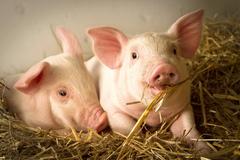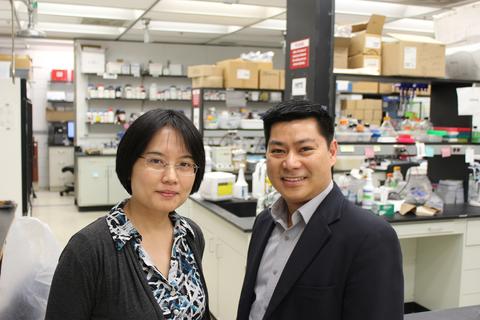- Issue:
Recent grants support many aspects of the College of Veterinary Medicine’s research and education efforts.
Rapid Agricultural Response Fund
Six CVM researchers were awarded a total of $1.1 million in support from the Minnesota Agricultural Experiment Station’s Rapid Agricultural Response Fund (RARF) in April:
- Dr. Julio Alvarez: Characterization of Emergent Antimicrobial Resistance in Salmonella Strains Residing at the Animal-Human Interface to Guide Evidence-Based Antimicrobial Stewardship in Veterinary Medicine
- Dr. Rafael Bisinotto: The Relationship Between Early Lactation Hoof Lesions and Behavior, Inflammatory Mediators, and Reproductive Performance in Dairy Cows
- Dr. Timothy Johnson: MnPoPPA: Informing Strategies for Autogenous Vaccine Development in Poultry
- Dr. Hinh Ly: Development of a Novel Vaccine to Protect Turkeys from Hemorrhagic Enteritis Virus Infection
- Dr. Sunil Kumar Mor: Re-emerging Turkey Arthritis Reovirus in Minnesota Turkeys: Development of Novel Diagnostic Assays and Control Strategies
- Dr. Montserrat Torremorell: A Comprehensive Surveillance System to Control Influenza Virus in Pigs
The RARF was established by the Minnesota Legislature and state agricultural leaders in 1998 to create resources to tackle emerging agricultural challenges. The fund has helped develop research answers to some of the most puzzling and unpredictable problems facing Minnesota farmers.
Antimicrobial resistance education
Dr. Jeff Bender, professor of veterinary public health, and the Minnesota Department of Health were awarded a grant by the Centers for Disease Control and Prevention as part of the Integrated Food Safety Centers of Excellence to modify and update antibiotic-resistance training materials for veterinary students and veterinarians. The Antimicrobial Resistance Learning Site was initially developed 10 years ago. This new effort will engage state and federal government agencies and faculty across the United States, with the goal of providing a practical and applied learning resource for veterinary students. The educational training materials include species-specific case studies to reinforce key and timely issues.
Canine health
- Dr. Mike Conzemius, professor, was awarded a grant from Unity Biotechnology to explore the role of cellular aging in canine knee osteoarthritis.
- Morris Animal Foundation awarded a two-year grant to Dr. Erin Dickerson, associate professor, for a study of how metabolic processes affect tumor growth and chemotherapy resistance in dogs with hemangiosarcoma—and ways to block or disrupt these processes.
- Dr. Steven Friedenberg, assistant professor, received a research grant from the Clumber Spaniel Health Foundation to study the genetics of immune mediated hemolytic anemia (IMHA) in clumber spaniels, and an award from the English Cocker Spaniel Club of America to investigate the genetics of Addison’s disease and IMHA in English cocker spaniels.
- Dr. Eva Furrow, assistant professor, was awarded a two-year grant from Morris Animal Foundation for a canine health study of genetic risks for developing calcium oxalate urinary stones, a painful and common health problem in dogs.
Dairy health
Dr. Sandra Godden, professor, is the principal investigator on a one-year contract sponsored by Midwest Veterinary Service and Boehringer Ingleheim Vetmedica for the study, “Efficacy of ToDAY Intramammary Infusion for the Treatment of Clinical Mastitis in Lactating Dairy Cows.”
Equine health
- Dr. Connie Gebhart, professor, was awarded Boehringer Ingelheim Vetmedica’s Advancement in Research Award to support her research proposal, “Equine Proliferative Enteropathy—In Vitro Antimicrobial Activity Against Two Equine Lawsonia intracellularis Isolates.”
- Dr. Molly McCue, associate professor, is the principal investigator on “Tools to Link Phenotype to Genotype in the Horse,” a new three-year, $500,000 project funded by the U.S. Department of Agriculture’s National Institute of Food and Agriculture. McCue and Dr. Elaine Norton were also awarded a two-year grant from Morris Animal Foundation to explore the functional prioritization of candidate genes and alleles for equine metabolic syndrome.
Feline health
Drs. Jody Lulich, professor, and Eva Furrow, assistant professor, received funding from the Winn Feline Foundation for their research, “Characterization of Mineralization and Expression of Osteogenic Proteins in Feline Kidneys with and without Calcium Oxalate Uroliths.”
Swine health
- Dr. Marie Culhane, associate professor, is the principal investigator on a research grant sponsored by Boehringer Ingleheim Vetmedica for the one-year study, “Association of the Presence of Influenza A Virus in Pigs at Weaning with Post-Weaning Performance and Cost of Production.”
- The National Pork Board awarded funding to Dr. Montse Torremorell, associate professor, and the University of Michigan for “Demonstration of Airborne PRRSV Inactivation by a Non- Thermal Plasma.” The college also received support from the Swine Health Information Center to develop and validate methods to detect porcine rotavirus A, B, and C, rotavirus H, porcine teschovirus, and porcine hepatitis E virus.
Wildlife health
- The U.S. Department of Energy funded a project at The Raptor Center (TRC) to improve technologies that will protect eagles sharing airspace with wind turbines. TRC is collaborating with colleagues at the College of Science and Engineering, Center for Applied and Translational Sensory Science, and Boys Town National Research Hospital Developmental Auditory Physiology laboratory on a project designed to understand eagle physiology and behavior, including the hearing capabilities of bald and golden eagles.
- Dr. Tiffany Wolf, assistant professor, is the principal investigator on a one-year research grant from the Indianapolis Zoological Society for research on moose calf health and survival.
Viral and bacterial pathogens
- Dr. Sagar Goyal received a three-year award from the U.S. Department of Agriculture’s National Institute of Food and Agriculture for “Decontamination of Food and Food-Processing Surfaces from Viral and Bacterial Pathogens by Cold Plasma Technology.”
- The National Institutes of Health’s National Institute of Allergy and Infectious Disease awarded Drs. Yuying Liang and Hinh Ly with funding for their project, “Mechanism of Lassa Fever Virus Z Protein in Immune Suppression and Viral Virulence.”



